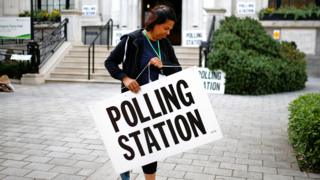 Image copyright
Image copyright
Reuters
Voters are heading to the polls for the European Parliament elections.
Seventy-three members, known as MEPs, will be elected in nine constituencies in England, and one each in Scotland, Wales and Northern Ireland.
Each region has a different number of representatives based on its population – ranging from three MEPs in the North East and Northern Ireland to 10 MEPs in the South East.
Polling stations in the UK are open until 22:00 BST.
The Netherlands is also voting on Thursday while voting in other EU nations will take place at various times over the next three days.
The results will be announced once all EU nations have voted, with the voting process expected to be completed by 22:00 BST on Sunday.
Voters must be registered to vote, be 18 years old or over on 23 May, be a British, Irish or qualifying Commonwealth citizen or a citizen of an EU country.
They have to be resident at a UK address (or a British citizen living abroad who has been registered to vote in the UK in the last 15 years) and not be legally excluded from voting.
MEPs are elected in the order listed by their party, based on the total share of the vote in each region.
In the nine English regions, Wales and Scotland, the number of MEPs is calculated using a form of proportional representation known as the D’Hondt formula, and each voter can choose one party or individual to back.
The process is slightly different in Northern Ireland, where the Single Transferable Vote (STV) system is used, allowing voters to rank the parties standing in order of preference.
European elections begin in UK and Netherlands

